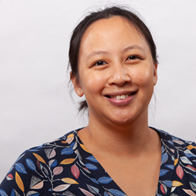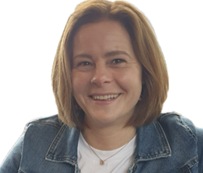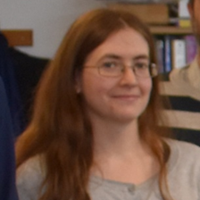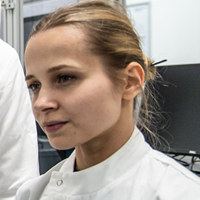This week we are celebrating International Day of Women and Girls in Science, which was based on the theme 'Closing the Gender Gap in Science: Accelerating Action'.
Statistics show that although academic performance is close between girls and boys in science and mathematics, gendered stereotypes continue to be an issue. Girls are not encouraged as much as their male counterparts to apply for STEM roles and have limited choices for their education and career development1.
OGT's workforce includes many women who have successful STEM careers. Take a look at some of their stories across various roles in the OGT organisation...
 Jackie Chan, Head of NGS Development, Oxford
Jackie Chan, Head of NGS Development, OxfordMy role at OGT is Head of NGS development and I'm based out of the Oxford office. I've been with OGT for 10 years. Before that I was a post-doc at the University of Birmingham and Warwick, working as a microbiologist.
I joined OGT in 2014 on a grant funded project to see if we could use our hybridisation expertise to enrich and sequence pathogenic genetic material from clinical samples. I'm currently working on OGT's NGS portfolio and extending the SureSeq™ range.
It is a marathon not a sprint and there will be some spectacular highs and energy-draining lows. To maintain your mental health, find your own way to manage these.
The human genome had just been published and having that information it was going to solve all genetic problems. Turns out it has led to more questions being asked than answers given. I love (and sometimes hate) an un-answered question.
Giving up my pipettes and moving on with my career. I loved lab work.
Getting a paper published in New England Journal of Medicine2. Also being part of the team that landed a big account in Canada.

I came to OGT with 18 years of NHS experience, working in Norwich, London and Cambridge, where I spent 12 years as a Scientist working in leukaemia cytogenetics as part of the Haemato-Oncology Diagnostic Service (HODS).
I’m also a State-Registered Clinical Scientist and have maintained my state registration since leaving my clinical diagnostic role by continually compiling a record of all relevant Continual Professional Development (CPD) activities.
I have been involved in managing OGT’s internal analytical/stability studies as Validation & Verification (V&V) Team Lead and the external clinical data as Medical Affairs (MA) Manager, and was part of the team who were integral to our successful IVDR products submission and approval with our notified body – a huge achievement within the company as this was the world’s first IVDR approval for FISH probes!
If interested in a career in science undertake as many qualifications in science as you can – be that starting with GCSEs, then onto A-levels or Higher National courses, looking towards specialising in a science based degree, masters, and perhaps even onto a PhD!
I would highly recommend a career as a Clinical Scientist and undertaking the Clinical Scientist Training Programme (STP)/Higher Specialist Specific Training (HSST) Programme as a great starting place to a career in science. To be successful in obtaining a place on these programmes it is always an advantage to have had practical experience, as many applicants have only their classroom experience, so having science-based work experience on your CV will always make you stand out from others. Make use of any connections you or anyone you know has to gain work experience!
I have always loved science! My affinity for science was always more in the field of biology than chemistry or physics, and I’ve always found biology, but particularly human biology, completely fascinating! I’m the type of person who finds studying a subject so much easier when really interested in it – so I’ve always had a natural affinity in studying science and getting good results in science subjects inspired me to study a Human Biology Degree (BSc Hons) at Loughborough University.
I’ve been inspired by many famous women in science, such as Marie Curie and Rosalind Franklin, who were seen as difficult women at the time, but are now admired and recognised for their contributions to the progress made within science over the years. I hope I inspire others to pursue a career in science and encourage both of my daughters to be interested in science!
My biggest challenge has been becoming a manager of a team. This is something new I’ve had to learn at OGT.
As a Clinical Scientist, I had many responsibilities, but I did not manage a team directly previously. Being a manger isn’t something you train or study for – it’s something you learn as a manager in the role. It can be hard to find the time to mentor each member of your team individually and to always be a role model to your peers and team as a manager – I’ve learnt that even on a bad day you need to set a good example as a manager.
With a career spanning 25 years – there are so many! But the standout highlights would be my BSc (Hons) degree in Human Biology as the first member of my family to attend university and obtain a degree, my clinical scientist state registration, obtaining over 10 years NHS service, progressing within my role at OGT and the successful IVDR submission.
Being part of the OGT team who achieved the first IVDR-certified FISH probes to market was a real team effort and seeing everyone work together collaboratively and achieve our end goal was a truly amazing experience and I’m very proud to have been part of the team that achieved this!
 Laura Parkes, Senior Software Developer, Oxford
Laura Parkes, Senior Software Developer, OxfordI studied computer science at the University of Oxford before starting work at OGT as a software developer.
Initially I was working on the continued development of the CytoSure® Interpret software and have been part of the development process of the newer Interpret software (for NGS analysis). My main focus recently has been creating a cloud version of this software.
I think my main advice would be to just go for it and not give up. Find your interests and don’t be afraid to follow them or try new things.
My interest in programming was supported by my parents from when I first started showing an interest who encouraged me to follow my interests.
A definite highlight has been working on deploying Interpret onto the cloud as this was something I hadn’t had an opportunity to do and I’m enjoying learning all about how to run software in this way.
 Tiffany Damon, NGS Scientist, Oxford
Tiffany Damon, NGS Scientist, OxfordI’m an NGS scientist, and former placement student with OGT with an academic background bridging life and health sciences. I may just be starting out, but already I’m working on a variety of projects, with special attention to protocol troubleshooting. I also have the freedom to work on especially creative things, like writing educational pieces for anyone curious about NGS.
There are many ways to succeed, and just because something can feel frustrating or doesn’t go exactly as you first planned, that doesn’t mean you can’t eventually succeed and even excel; resilience is key.
You also don’t need to fit some narrow idea of a scientist – there are many ways people with a background in science can contribute in ways that suits them as individuals, and just because you may not fit one organisation, this does not mean you can’t thrive in another.
I realised I had both a constant desire to be learning, and a need to contribute positively to the wider community – while you can potentially do this in many careers, I had always done well in sciences and loved being surrounded by other people that felt the same.
Early on as an A-level student, I struggled with knowing what I wanted to do and lacked a lot of confidence in my abilities – and opted not to go to university.
It was only after I took my first full time job that I realised how important to me things like independence, learning, and the contributions of my job to the community were. Learning this about myself, I was able to independently study and take exams as a mature student, get into my university of choice, get my degree in Molecular and Cell Biology, go on to a Masters in Health Research, and ultimately come to a place where I can work on technology that matters!
I’m still early in my career! But I’m ecstatic to be starting out as a scientist and excited by the many options ahead for the sorts of projects I could work on, and all for the betterment of diagnostics in healthcare. I love knowing that there’s always going to be something new.
Chan JZM et al. N Engl J Med 2013;369:289–290. doi: 10.1056/NEJMc1302295

We sit down with two of our Field Application Scientists, Ashley Hart and Jenny Morse, to discuss the technical expertise they offer to OGT customers all over North America. And we chat with one of our customers, Kathleen Kretkowski, about a real-life example of OGT support in action.
Read
With many of our team once being customers themselves, our scientists endeavour to create a portfolio shaped by a genuine understanding of its real-world clinical application. Meet Jackie Chan and Huiyan Jin, two of OGT’s Next Generation Sequencing (NGS) experts.
Read
Rich and Tori explain how their combined 40 years of experience in clinical diagnostics has been invaluable in helping them to support their customers.
Read